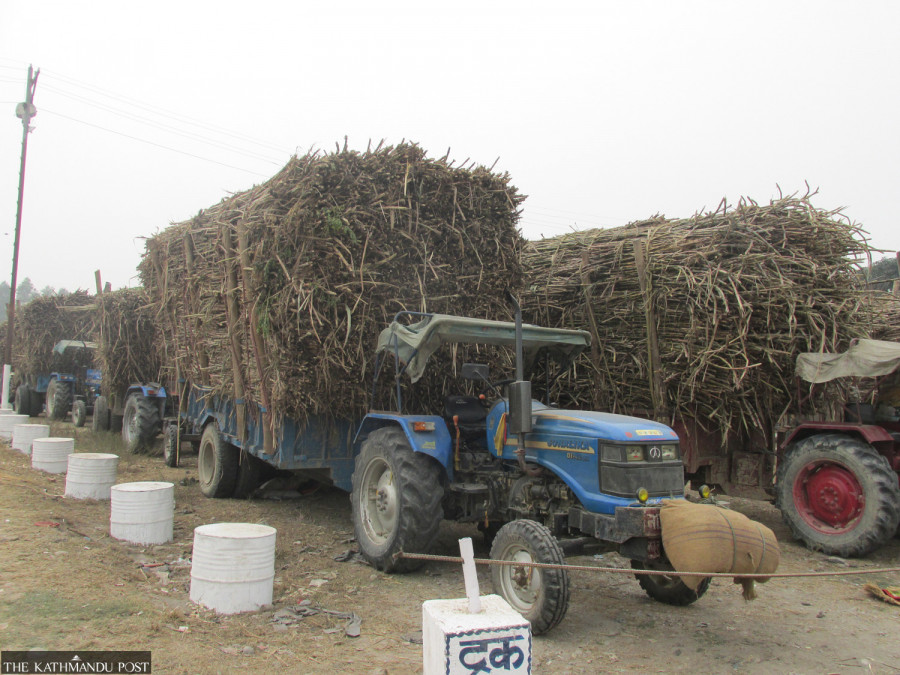
The harvest season started in mid-November, but the government still has not set the floor price.
Sugarcane farmer Ashok Yadav got tired of waiting for the government to fix the minimum price for this year's crop, and decided to sell his harvest at last year's rate.
Yadav had delayed selling his sugarcane for more than one and a half months, but there was no sign from the government that the floor price would be published anytime soon.
So he loaded up his harvest on a tractor trailer and trundled off to Baba Baijunath Sugar Mill to sell it at the old rate of Rs590 per quintal. The minimum support price is the government guaranteed price for farmers which is set annually.
“I had no option so I decided to sell it at last year’s rate despite a rise in the cost of production,” said Yadav. If the sugarcane is left on the field, it will decay; and if left uncut, it will start to dry up with the summer season nearing," he said.
“We used to plant sugarcane on 10 bighas till a few years ago, but now we do it on only 1 bigha because of the constant hassle of getting payment from the mills. Producing sugarcane means suffering losses every year,” said Yadav, a resident of Garuda Municipality, Rautahat.
"The sugar mills are buying sugarcane at last year’s rate of Rs590, and have said that they will pay any increased amount in the new rate after the government sets the minimum support price."
According to Yadav, with the government delaying making a decision on the price, most of his farmer friends hard up for money are even selling their sugarcane to jaggery factories for Rs330 to Rs350 per quintal.
"The district used to produce 300,000 tonnes of sugarcane annually, but output has now shrunk to 50,000 tonnes. Around 15 percent of the farmers have started harvesting their crops," he said.
The sugarcane harvest season started in mid-November, but the government has not set the minimum support price for the crop even though two months have passed.
Last year, the government had increased the minimum support price of sugarcane by 8.39 percent to Rs590 per quintal.
Sugarcane farmers had proposed a minimum rate of Rs705 per quintal for this year’s harvest because of the difficulty of getting subsidised fertiliser, the high cost of diesel, a twofold increase in wages for ploughing, higher farm wages and a twofold increase in transportation costs.
The floor price is normally announced before the harvest on the basis of the recommendations of the Ministry of Agriculture and Livestock Development.
Prakash Kumar Sanjel, joint secretary of the Ministry of Agriculture and Livestock Development, says the proposed minimum support price for this season has reached the cabinet where it is awaiting action.
“Due to a change in government, we sent a fresh proposal to the new cabinet. It has been more than a week now. The next cabinet meeting might decide the minimum support price,” said Sanjel.
"Technically, the Department of Agriculture recommends the minimum support price by conducting a field study. But since this is a political issue, all parties including sugar producers, sugarcane growers and the government have to agree," Sanjel told the Post in a recent interview.
Since sugarcane is listed as an industrial crop, the Ministry of Industry, Commerce and Supplies used to present the minimum support price to the cabinet. Government officials said the Agriculture Ministry would perform the task this year.
Kapil Muni Mainali, president of the Federation of Sugarcane Producers Associations, said the government should set the minimum support price by mid-December following the start of the harvest season.
“Officials at the Agriculture Ministry have been saying that the price is being delayed because a new minister has not been appointed,” he said.
“The farmers have to live on the income from their sugarcane crop, but till now the price has not been fixed. The delay has made life difficult for them,” Mainali said.
"The farmers are selling their crops at last year’s price. When the government eventually sets the price, the mills will pay them extra if it is more than last year. If the government had set the minimum support price on time, there would have been no problem. The delay could cause a decline in production next year," he added.












